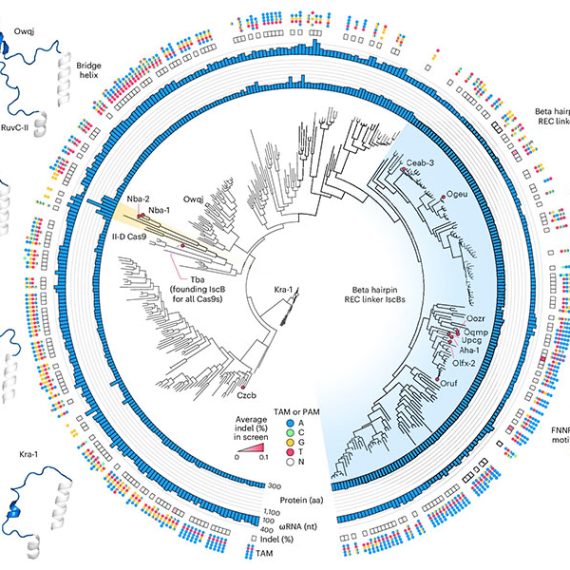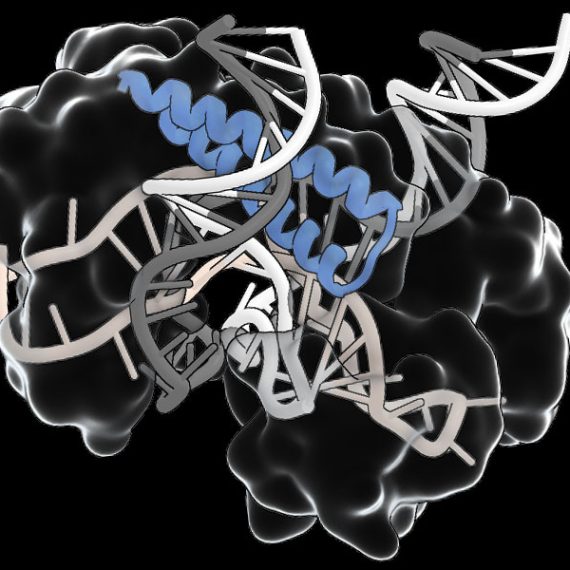Gene-editing technology developer Feng Zhang awarded $500,000 Lemelson-MIT Prize
MIT associate professor and member of the Broad Institute and McGovern Institute recognized for commitment to invention, collaboration, and mentorship.

Feng Zhang, a pioneer of the revolutionary CRISPR gene-editing technology, TAL effector proteins, and optogenetics, is the recipient of the 2017 $500,000 Lemelson-MIT Prize, the largest cash prize for invention in the United States. Zhang is a core member of the Broad Institute of MIT and Harvard, an investigator at the McGovern Institute for Brain Research, the James and Patricia Poitras Professor in Neuroscience at MIT, and associate professor in the departments of Brain and Cognitive Sciences and Biological Engineering at MIT.
Zhang and his team were first to develop and demonstrate successful methods for using an engineered CRISPR-Cas9 system to edit genomes in living mouse and human cells and have turned CRISPR technology into a practical and shareable collection of tools for robust gene editing and epigenomic manipulation. CRISPR, short for Clustered Regularly Interspaced Short Palindromic Repeats, has been harnessed by Zhang and his team as a groundbreaking gene-editing tool that is simple and versatile to use. A key tenet of Zhang’s is to encourage further development and research through open sharing of tools and scientific collaboration. Zhang believes that wide use of CRISPR-based tools will further our understanding of biology, allowing scientists to identify genetic differences that contribute to diseases and, eventually, provide the basis for new therapeutic techniques.
Zhang’s lab has trained thousands of researchers to use CRISPR technology, and since 2013 he has shared over 40,000 plasmid samples with labs around the world both directly and through the nonprofit Addgene, enabling wide use of his CRISPR tools in their research.
Zhang began working in a gene therapy laboratory at the age of 16 and has played key roles in the development of multiple technologies. Prior to harnessing CRISPR-Cas9, Zhang engineered microbial TAL effectors (TALEs) for use in mammalian cells, working with colleagues at Harvard University, authoring multiple publications on the subject and becoming a co-inventor on several patents on TALE-based technologies. Zhang was also a key member of the team at Stanford University that harnessed microbial opsins for developing optogenetics, which uses light signals and light-sensitive proteins to monitor and control activity in brain cells. This technology can help scientists understand how cells in the brain affect mental and neurological illnesses. Zhang has co-authored multiple publications on optogenetics and is a co-inventor on several patents related to this technology.
Zhang’s numerous scientific discoveries and inventions, as well as his commitment to mentorship and collaboration, earned him the Lemelson-MIT Prize, which honors outstanding mid-career inventors who improve the world through technological invention and demonstrate a commitment to mentorship in science, technology, engineering and mathematics (STEM).
“Feng’s creativity and dedication to problem-solving impressed us,” says Stephanie Couch, executive director of the Lemelson-MIT Program. “Beyond the breadth of his own accomplishments, Feng and his lab have also helped thousands of scientists across the world access the new technology to advance their own scientific discoveries.”
“It is a tremendous honor to receive the Lemelson-MIT Prize and to join the company of so many incredibly impactful inventors who have won this prize in years past,” says Zhang. “Invention has always been a part of my life; I think about new problems every day and work to solve them creatively. This prize is a testament to the passionate work of my team and the support of my family, teachers, colleagues and counterparts around the world.”
The $500,000 prize, which bears no restrictions in how it can be used, is made possible through the support of The Lemelson Foundation, the world’s leading funder of invention in service of social and economic change.
“We are thrilled to honor Dr. Zhang, who we commend for his advancements in genetics, and more importantly, his willingness to share his discoveries to advance the work of others around the world,” says Dorothy Lemelson, chair of The Lemelson Foundation. “Zhang’s work is inspiring a new generation of inventors to tackle the biggest problems of our time.”
Zhang will speak at EmTech MIT, the annual conference on emerging technologies hosted by MIT Technology Review at the MIT Media Lab on Tuesday, Nov. 7.
The Lemelson-MIT Program is now seeking nominations for the 2018 $500,000 Lemelson-MIT Prize. Please contact the Lemelson-MIT Program at awards-lemelson@mit.edu for more information or visit the MIT-Lemelson Prize website.




